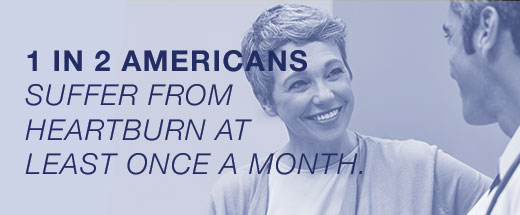Most people are familiar with the feeling - that burning sensation creeping up underneath your breastbone. It’s heartburn and, unfortunately, minor and occasional occurrences are a part of life for many Americans.
However, if heartburn is a regular occurrence for you, it’s time to get checked out.
Untreated chronic heartburn can lead to severe risks. Over time, the continual flow of acid up into your esophagus can lead to scarring, which can cause swallowing difficulties. Left untreated, changes to the lining of your esophagus could develop into Barrett's esophagus, cancer and other conditions.
If you have indigestion on most days for three weeks or more, or if it’s getting worse, schedule an appointment with your gastroenterologist.
Treatment
For most people, avoiding triggers, diet changes, increased exercise and taking antacids can successfully treat heartburn. Common triggers for heartburn include:
- Large meals
- Spicy or acidic foods
- Fried or fatty foods
- Alcohol and caffeine
- Smoking

Contact us to schedule an appointment or screening today.
Schedule your appointment todayGastroesophageal Reflux Disease (GERD)
Gastroesophageal reflux disease, also called GERD or acid reflux disease, is a very common disorder that causes heartburn. GERD occurs when the stomach contents reflux, or back up, into the esophagus.
As we eat, food travels from the mouth to the stomach through the esophagus. The esophagus is comprised of tissue and muscle layers that expand and contract, pushing food to the stomach through wave-like movements. Where the esophagus meets the stomach, there is a circular ring of muscle called the lower esophageal sphincter (LES). Once you swallow, the LES relaxes, allowing food to enter the stomach and then contracts, preventing the back up of food and acid into the esophagus
Sometimes, the LES is weak or becomes relaxed because the stomach is distended, which allows stomach acid to re-enter the esophagus. Often this is normal and occurs without symptoms shortly after meals. However, if nagging symptoms persist or injury to the esophagus is found, acid reflux becomes GERD. This injury to the esophagus arises when stomach acid refluxes frequently, is very acidic or when the esophagus is unable to clear the acid quickly.
Symptoms
The most common symptoms of GERD are acid indigestion and heartburn. Other symptoms include:
- Nausea
- Vomiting
- Tooth erosion
- Abdominal pain
- Regurgitation
- Dry, chronic cough
- Difficulty or painful swallowing
- Sore throat
- Hoarseness of voice
- Breathing issues
- Bitter taste in the back of mouth
Diagnosis
GERD is diagnosed based on your symptoms and response to treatment. The most common symptom is heartburn, a burning sensation that rises from the stomach or lower chest. Occasional heartburn is normal, but if it occurs two or more times a week, you should consult a gastroenterologist to determine if it’s due to GERD.
If your gastroenterologist suspects your chronic heartburn is actually GERD, a few diagnostic tests may be ordered.
Upper endoscopy is a procedure in which a small, flexible tube with a camera is used to examine your esophagus, stomach and small intestine. A biopsy may be taken if abnormalities are found.
Acid measurement
For this test, your gastroenterologist will insert a small, flexible tube through the nose and esophagus for 24 hours to measure the amount of acid that refluxes into the esophagus.
pH monitoring
Your gastroenterologist may also use a Bravo capsule, a small, pill-sized device placed in your esophagus during an upper endoscopy, to monitor and report pH levels over a 48-hour period.
Esophageal manometry
Esophageal manometry uses a small, flexible tube with pressure sensors to determine if the muscles in the esophagus and esophageal sphincter are functioning properly. This procedure is used to diagnose many gastrointestinal disorders, including acid reflux and GERD.
Treatment
Initial treatments for GERD include lifestyle changes like diet and exercise, antacids, histamine blockers and, for more severe cases, proton pump inhibitors. Your gastroenterologist will discuss any recommended lifestyle changes and medications with you.
If, despite the initial treatment, your gastroenterologist notices more persistent symptoms such as weight loss, vomiting blood, black tarry stool, a family history of stomach cancer or if you come from endemic region for stomach cancer, further testing may be ordered.
Peptic Ulcer Disease
If your body fails to neutralize stomach acid or makes too much acid and overcomes the ability to neutralize it, an ulcer may develop in the stomach or duodendum. In the United States, over 4 million patients develop peptic ulcer disease each year, and the majority of ulcers heal without complication.
Common causes of peptic ulcer disease include use of nonsteroidal anti-inflammatory medications (NSAIDs), Helicobacter pylori bacteria and smoking.
Symptoms
The symptoms caused by an ulcer may include:
- Pain when the stomach is empty (often relieved when food or antacid is ingested)
- Nausea
- Vomiting
- Digested blood in the stool (bowel movement). The stool would appear black, sticky and have a foul odor.
If bleeding occurs, consult your gastroenterologist immediately.
DIAGNOSIS
Peptic ulcer disease is typically diagnosed using a procedure called upper endoscopy. Patients presenting with PUD symptoms will be also tested for Heliobacter pylori. The results of both of these tests will determine your course of treatment.
Treatment
Most ulcers can be treated medically with a variety of medications, but surgery may be recommended for other complications from ulcers. If Heliobacter pylori is found, your gastroenterologist may also recommend a 7-14 day treatment plan including acid blocking medications and antibiotics.
In the case of gastric ulcers, a repeat endoscopy will be preformed 6-8 weeks after diagnosis to confirm healing.



